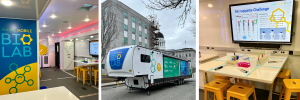Nonprofit organization Learning Undefeated, nationally known for its fleet of mobile STEM labs, has been working in partnership with Educate Maine for over a year to design and build Educate Maine’s Biolab that will focus on rural communities and visit 12 sites this school year. The idea is to spark students’ interest in STEM and build an educated future workforce for Maine’s burgeoning life-science industry so students will stay, study, and work in Maine.
The new lab has multiple cold-weather innovations, such as warming cabinets for scientific reagents and an extensive solar power system. Learning Undefeated has also adapted its bioscience curriculum to make it culturally relevant for Maine students, incorporating lessons from emerging and heritage industries such as bioengineering, chemistry, fisheries, wildlife, and renewable energy.
Herself an alumnae of the Bangor school system, Learning Undefeated’s Executive Vice President of Communications, Janeé Pelletier, has long hoped to develop a program for her home state. “This mobile lab will change the way that Maine students like me think about biotechnology careers,” said Pelletier. “It is so difficult for students to visualize job opportunities if they don’t know someone who works in the field. This program will help them realize that biotech in Maine is a vibrant career path with many avenues for meaningful work and financial stability.”
“Did you know that there are about 9,000 life-science jobs in Maine right now?” said Kate Howell, Educate Maine’s Director of Workforce Partnerships. “These jobs pay an average of $100,000 a year, and they are located all over the state. People don’t have to leave Maine to secure those excellent – and rewarding! – jobs.”

The Biolab is 50 feet long, weighs about 20,000 pounds, and contains lab benches, seating, audio-visual displays, and storage for plenty of standard and cutting-edge laboratory tools, from pipettes to microscopes. Built on an RV chassis, the lab can hold about 24 students at one time. It will be towed from site to site by a professional hauler.
Two STEM educators will travel with the Biolab and work with teachers to customize curricula for each school. Some of the lessons already prepared include the “Micropipette Challenge” — which teaches lab measurements and materials — and “Parasite Predicament” which explores diagnostics. Lessons aboard the Biolab will complement — not replace — classroom work, but the lab offers the dedicated space and supplies that many schools, particularly in rural districts, lack.
Other partners include Northeastern University’s Roux Institute, IDEXX, BIOME (The Bioscience Association of Maine), the University of Maine System, Maine Health, the University of New England, Learning Undefeated and Yokogawa Fluid Imaging Technologies. Federal and state dollars are also supporting the Biolab.
A ribbon-cutting at the State Capitol will officially open the Biolab. The first stop on its statewide tour will be in Fort Kent on March 11, where students, parents, and community members are invited to tour the lab before classes start on March 12.






